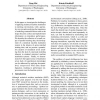Free Online Productivity Tools
i2Speak
i2Symbol
i2OCR
iTex2Img
iWeb2Print
iWeb2Shot
i2Type
iPdf2Split
iPdf2Merge
i2Bopomofo
i2Arabic
i2Style
i2Image
i2PDF
iLatex2Rtf
Sci2ools
123
click to vote
COLING
2010
2010
Contextual Modeling for Meeting Translation Using Unsupervised Word Sense Disambiguation
In this paper we investigate the challenges of applying statistical machine translation to meeting conversations, with a particular view towards analyzing the importance of modeling contextual factors such as the larger discourse context and topic/domain information on translation performance. We describe the collection of a small corpus of parallel meeting data, the development of a statistical machine translation system in the absence of genre-matched training data, and we present a quantitative analysis of translation errors resulting from the lack of contextual modeling inherent in standard statistical machine translation systems. Finally, we demonstrate how the largest source of translation errors (lack of topic/domain knowledge) can be addressed by applying documentlevel, unsupervised word sense disambiguation, resulting in performance improvements over the baseline system.
COLING 2010 | Computational Linguistics | Machine Translation Systems | Statistical Machine Translation | Translation Errors |
Related Content
| Added | 13 May 2011 |
| Updated | 13 May 2011 |
| Type | Journal |
| Year | 2010 |
| Where | COLING |
| Authors | Mei Yang, Katrin Kirchhoff |
Comments (0)

